- Home
- Shannon Hale
Dangerous Page 6
Dangerous Read online
Page 6
Every once in a while (i.e., a hundred times an hour) I checked to see if the mark was still there. My skin over the mark was warm, a localized fever.
The crew got us dinner and tucked us into the crew beds, which were like sleeping bags attached to the walls.
I shut my eyes, trying to shut off my thoughts, and the darkness seemed to shift into something tangible, something real and huge, something that I could fall into. I was already falling. Fear of what the token might do to me made my heart feel leaden, and yet excitement tickled my belly.
I shifted in my sack, afraid and excited and too tired to sleep.
Chapter 10
After a few hours of darkness-staring, I pulled free from the Velcro bag and went back to the lab. A headache had been swelling ever since the token crawled up my arm. I found pain relievers in a med kit and took them with a squirt of water.
The moon was out of sight, but a thick band of speckled light showed one sweep of the Milky Way. For years I’d known its stats—a spiral galaxy housing 300 billion stars, just one of billions of galaxies in the universe. But until that moment, I’d never really absorbed the fact that the Milky Way galaxy wasn’t something far away—I was in it.
Earth seemed alien, eerie in its darkness, a black orb marred with the orange electricity of cities in splutters and cracks like bleeding lava. I could no longer imagine what my life would be like when I returned there.
Wilder emerged from the crew quarters, rubbing his head. Jacques and Ruth started rummaging around the kitchen area.
“I don’t feel good,” said Ruth, holding her stomach.
“Then maybe you shouldn’t eat,” I said.
“I can’t help it,” she said, her fists full of protein bars.
Jacques nodded agreement, sucking in his fifth bag of yogurt.
I went back to Mi-sun’s sack and found her awake and twitching.
I rubbed my sternum. Was the token a kind of computer? A bomb? An egg sac? Maybe soon robot babies would tear out of me and take over the world.
Howell came up from the pod.
“The tokens are doing something to us,” I said.
She nodded. “We’re going back, and we’ll figure it out.”
She and the other crew readied the pod while the five of us waited in the lab. I noticed that we sort of clumped together, shoulders and knees bumping and touching. We watched the moon rise.
“I don’t like being afraid,” Ruth whispered.
No one responded. I think the others were as startled as I was to hear those words from Ruth. She kept talking, glancing from the window to Wilder.
“My sister hits me,” she went on. “Usually on my head so my hair will hide the marks. Grandma won’t tolerate crybabies, so I stopped crying. I shouldn’t let Sabine hit me, right? That’s what I think, until I go home after school and there she is, and I’m scared and don’t say a word.” She glared at us. “This doesn’t mean you can feel sorry for me. I just wanted to say it out loud.”
“Thanks,” I said.
Ruth shrugged. “We can’t let them hurt us. Any of us.”
“We won’t,” said Wilder. “That’s what a team is for.”
Ruth looked at Wilder, considering, then said, “Okay.”
Mi-sun put her hand out. Wilder put his hand on top of hers and the rest of us followed, as if we were a Little League team. It did make me feel safer somehow.
“Did you guys know that ‘fireteam’ is a military term?” Mi-sun’s voice was so trembly from her shaking I had to strain to understand. “My mom’s military. A fireteam is the smallest unit of s-s-soldiers.”
“Fitting, since we’re probably being reprogrammed into the advance force of an alien invasion,” said Jacques.
“I highly doubt that,” Wilder said.
“Why would the tokens seize us and ignore the adults?” asked Mi-sun.
“I don’t know.” Jacques stared at his hand. “Does my skin look weird to you?”
“Your everything looks weird to me,” said Ruth, eating a protein bar.
Jacques peered closer at his arm. “It feels weird …”
Mi-sun bumped into me, and I could feel how hard she was shaking. She reminded me of Baron Harkonnen, Luther’s pet bunny. The baron wasn’t exactly a calming influence. Every time anyone held him, that rabbit literally vibrated with panic, his pink eyes open wide, fuzzy white nose going like a jackhammer.
Mi-sun’s just a kid, I reminded myself, and I wished my mom were there to take care of her.
“So, is your dad military too?” I asked, hoping to distract her.
“No. He’s crazy,” said Mi-sun.
Wilder and Jacques looked up. Mi-sun’s gaze was full of stars, but her mouth was serious.
“He hasn’t hurt anyone yet, so insurance won’t send him to an institution. He just stays home and g-g-grumbles. After school, when my mom’s at work, I take care of my little brothers. Sometimes I have to take my dad food. When I open his door, the grumbles turn into yells. Usually that’s all he does, but sometimes—”
“Mi-sun,” I said, interrupting her in case she wanted to stop talking.
“Sometimes he’s on top of the dresser or in the closet or—”
“Mi-sun,” Jacques said, as if afraid to hear any more.
“Or in the bathroom. One time I found him with our stuffed animals. He must have sneaked out of his room when we were asleep and taken them. He had them in the ba-bathtub, pushing them under the water, and … and I don’t want to go home.”
“What does he say?” Wilder asked. “When he grumbles.”
“Herma, harma, herma,” Mi-sun said in a scratchy low imitation of her father. “Herma arrgh toast soup. Toast soup crunchy toast eat it.”
Jacques and Ruth laughed. Mi-sun’s pale cheeks turned bright with a pleased blush.
Wilder rubbed the back of his head.
“You’ve got a headache too,” I said.
“Feels like there’s a rat with steel claws trapped in there,” he said, touching the top of his neck, “trying to dig free.”
That was exactly what it felt like, except the rat was clawing at my forehead. I laughed a little, and Wilder smiled, then we both laughed because what else are you supposed to do when you’re orbiting the Earth and alien technology is making your head feel like a cage for violent vermin?
I couldn’t keep laughing for long. By the time I climbed back into the pod, I could barely see for the pain.
“Wait,” I said as Dragon harnessed me in. “What if we really are the advance force of an alien army sent to destroy Earth—”
“You’re nobody’s puppet, Brown,” he said, patting my head. “And if I’m wrong, I’ll take you out myself and save the world.”
I couldn’t focus on his expression through the pain, but I was almost sure he was kidding.
We started the long descent, and I could feel force again as my shoulders pressed against the harness. Jacques was saying, “Oh bleep, oh bleep, oh bleep …” Apparently for his fear of heights, going down was worse than going up. I barely registered the planet enlarging outside my slit window. Pain screamed in my brain.
Suddenly space was gone, and we were in a barely blue sky, early in the morning. The pod stopped with a sigh, followed by a snap. The door hushed open, and warm, humid air gushed in.
I climbed onto the ocean platform, gravity a giant’s hand pushing down. My arms were like logs, my neck felt too weak to hold my head.
Ruth shoved past me, announcing to all of Earth that she was starving.
A breeze tickled the hairs on my face and hand and seemed to tie the world together—rough morning sun, swishing air, salty scent, and huge spaces of quiet. I gazed at the sliding color of the sky while my feet pressed hard against the ground and almost said, “Where do I belong?” Aloud, the question would have sounded cheesy and immature. But quiet in my head, it was small and hard and perfect, like a seashell. Where do I belong?
Ruth sat on the pocked metal floor and ripp
ed open a bag of potato chips.
As soon as we were back in Texas on the shuttle van to HAL, I asked to borrow Howell’s phone.
“Flapping mouths will prove dangerous,” she said. “You’ll be able to contact your parents shortly, but first, let’s figure out as much as we can.”
I hugged my chest and stared out the window. The world pulsed with pain.
We spent the rest of the day in a large lab being examined by Howell’s MDs and PhDs. Pain meds did nothing. One bonus of the crippling headache was that I barely noticed the spinal tap.
When the doctors sent us to bed, I flailed through sleep, the headache riding with me into dreams and out again. It was easier to just give up trying.
All my stuff had been moved into my cozy room, so I tossed aside the boot camp jumpsuit and dressed in my normal Maisie uniform: hightop sneakers, jeans, peach cotton blouse, a clay bead necklace, and silver hoop earrings. I brushed my hair back into my usual ponytail.
I had a sudden conviction that Wilder was leaving his room. I squeaked open my door, and there he was, just shutting his own.
He glanced at me. He took a double take. “You changed.”
I touched my face. “Is the alien worm rewriting my DNA?”
“No, I mean …” He gestured to my clothing.
I couldn’t read his expression. “So are you still going to be zombie-weird or are you normal-weird again?”
He frowned. “Sorry. Kinda. I don’t know. Can we just start over?” He stuck out his left hand. “Hi, I’m Jonathan Ingalls Wilder. And you are?”
“Being eaten from the inside out by a rabid hamster.”
He didn’t respond.
“Maisie Brown,” I said and shook his hand. And that was it. He’d chosen to erase everything that had happened between us.
“Nice to meet you,” he said, businesslike.
I didn’t answer—the words on my tongue were borrowed from Jacques’s lexicon.
I followed Wilder to the lab, where the whitecoats were pleased to subject us to more tests. In between my duties as a lab rat, I started to take apart the centrifuge. No one stopped me.
A crash startled me to my feet. Ruth stood beside the metal ruins of an examination table, her face redder than her hair.
“I didn’t mean to.” She stared at her hands. “This morning I tore off the faucet at my sink. I feel so weird, as if …” Her gaze wandered to the food table in the adjoining conference room. “Ooh, ham!”
Jacques and Mi-sun had arrived too. Jacques wasn’t wearing his black geek glasses, and his face seemed smaller, younger. Mi-sun was shaking away.
“Have the rest of you noticed increased strength?” Wilder asked.
Mi-sun and I shook our heads.
“No, but …” Jacques scooted in closer and whispered. “I clogged the shower drain.”
“Gross!” Ruth said.
“It wasn’t me! I mean …” Jacques held out his hand, palm down. “Watch.”
The back of his hand seemed a little shinier than before, and then his knuckles smoothed over as if being airbrushed. Something the color of his skin was growing over his hand. He removed a perfect mold and handed it to Wilder.
“Jacques is molting,” Mi-sun said.
“It’s not skin,” said Wilder.
There was another crash. Ruth stood over a broken conference table, a sandwich in each hand.
“Oops,” Ruth mumbled, her mouth full.
“Ruth, are your clothes pinching on you?” Wilder asked.
“What? No! I’m not gaining weight. I’m just … really hungry.”
But one of the doctors put Ruth on a scale and reported she’d gained thirty pounds since before our space trip.
“She looks the same to me,” I said.
“And thirty pounds can’t explain all that strength …” Wilder glanced at me as if I’d know why.
“Maybe she’s denser,” I said.
“Maybe you’re denser,” said Ruth.
So I shut up. But I was thinking about how everything is mostly empty space. If you compacted all the atoms in the planet, Earth would be the size of a golf ball and yet still weigh the same and have the same gravitational pull. What if the atoms of Ruth’s skin, muscles, and bones were compacting, even a little? With less space between the protons and electrons, her atoms would weigh the same but be so much denser. The repulsion between the protons and electrons would have to be masked somehow, and scientifically, that was impossible. But that word was rapidly losing meaning to me.
My headache was easier to bear when I was busy, so I kept fiddling with the centrifuge while Wilder talked with Mi-sun. She was gripping her hands together, but when he pulled them apart and touched her hand to his, he said he felt a prickling.
It was too hard to follow the conversation from under my cloud of pain. I put the centrifuge back together. Sometime later I heard a scream.
There was a small hole in the conference room wall, and on the other side Ruth was laid flat. She jumped back up, plucking a metal tack out of her shirt.
“Are you guys mental?” she said, hurling it back at the floor.
“I have a feeling,” Wilder said quietly, “that tack would have gone straight through anyone besides Ruth. Let’s try something less lethal.”
Mi-sun pinched Cheerios between her thumb and forefinger and aimed at the wall. The cereal shot from her fingers in an electric-blue streak, hit the wall, and shattered.
This was getting too bizarre. I started taking apart a defibrillator. I knew Wilder was standing next to me before I looked up.
“What are you up to?” Wilder asked me.
“Just … you know … preparing a defibrillator in case someone gets heart failure from Code Blue over there,” I said, nodding at Mi-sun.
One of the whitecoats returned with a piece of Jacques’s shedding and spoke to Howell. “I couldn’t cut through it with anything we have here. My best guess? It’s a polymer—”
“Of carbon, oxygen, and hydrogen,” said another whitecoat, swaying side-to-side, too excited to stand still. “Or maybe nitrogen!”
“What is it?” Mi-sun asked.
“Plastic,” I said.
Strong plastic, grown like armor. These changes weren’t disease symptoms. These were very specific alterations to our bodies.
Or to Ruth, Mi-sun, and Jacques anyway. What about me and Wilder, the headache twins?
“Are we dying?” I asked Dragon.
“Your vitals are good.” He showed me scans of my brain, and I could see the color blobs were different prespace and postspace. “That red streak is usually a dormant area, but yours is hot.”
I was trying to read Dragon’s notes when a loud clang knocked my headache. Howell was shaking a brass bell like an old-time town crier.
“Time for talking, my chickadees,” said Howell. “Time for deciding.”
Chapter 11
Dragon led the five of us to Howell’s office, plush with carpet, garish wallpaper, and floral-patterned sofas.
Wilder’s dad, GT, was leaning against Howell’s desk at the head of the room. His hair was combed back under a baseball cap, and he wore a plain T-shirt and cutoff jeans, but his eyes were all Wilder—blue and cunning. Wilder hesitated before standing at his shoulder.
Howell sat on the coffee table, her back to GT. She rooted in a bag and pulled out three red balls.
No way is she going to juggle, I thought.
She juggled.
There was a disbelieving kind of silence. At the end she threw one ball high and caught it behind her back. Mi-sun clapped politely.
“Thank you!” said Howell. “So, I can’t let you go home.”
“What?” said Ruth. “We’re, like, prisoners?”
“Oh, Miss Koelsch,” Howell said with an indulgent smile and then didn’t answer the question. “After this meeting, you might call your parents to say you earned a bonus week of specialized training.”
“We need to keep together,” said Wilder, “figu
re out what the tokens are doing to us and why.”
I blinked. This tone was new for Wilder.
“So far we’ve learned that each token contained likely trillions of nanites,” said Howell.
“Trillions of what?” asked Ruth.
“Nanorobots,” I said. “Microscopic robots engineered to perform functions at a molecular level.”
Howell beamed at me. “Exactly. We found nanites in your spinal fluid. As soon as we extract them, they shut down, so it appears they only function while in the body their token inhabits. It would be impossible to extract them all. They take up residence in the brain and other organ systems, altering the cells of your body.”
Ruth went to sit on the arm of the sofa, tripped, and shattered a metal-and-glass side table.
“Oops,” she said, crawling out of the pile of broken glass. She looked at her hands and knees. Not a scratch.
During my sleepless night, I’d wondered if Howell had lied to us—if somehow she herself had manufactured the tokens and deliberately infected us with them. But this technology was beyond space elevators. I looked at my palm, where the token had passed through my skin without a mark. The technology was so alien, I got goose bumps.
“You should remain here until we figure out what the nanites do and how to remove them,” Howell was saying.
“Can you cut out the token?” Mi-sun asked, but even as she said it, she put a protective hand over her chest. I knew how she felt. My token was starting to feel unnaturally right in my chest, like an organ I couldn’t live without.
“Removing the token would not remove the nanites loose in your body, Miss Hwang. Besides, the scans show that the token is linked with your heart. Any attempt at retrieval would put you at risk for heart failure.”
“I would take my son home right now and have my own doctor remove the thingie,” said GT. He unwrapped a stick of gum, broke off half, and slipped it into his mouth. “But I believe there’s no way to remove it without killing you. And you should know, there are plenty of people who would be willing to do just that to get your token.”

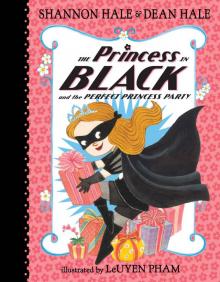 The Princess in Black and the Perfect Princess Party
The Princess in Black and the Perfect Princess Party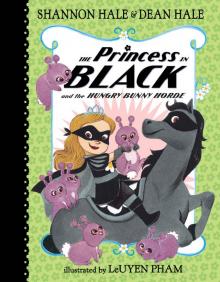 The Princess in Black and the Hungry Bunny Horde
The Princess in Black and the Hungry Bunny Horde The Unfairest of Them All
The Unfairest of Them All Forest Born
Forest Born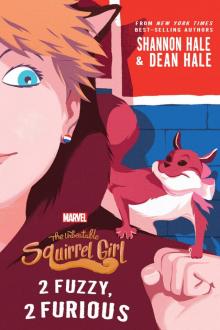 2 Fuzzy, 2 Furious
2 Fuzzy, 2 Furious The Actor and the Housewife
The Actor and the Housewife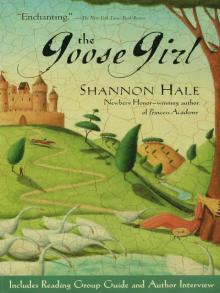 The Goose Girl
The Goose Girl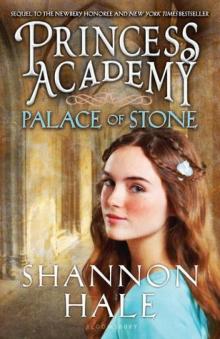 Palace of Stone
Palace of Stone Midnight in Austenland
Midnight in Austenland Enna Burning
Enna Burning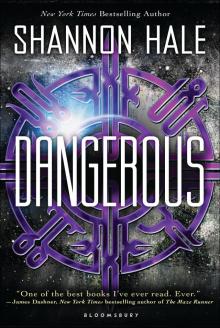 Dangerous
Dangerous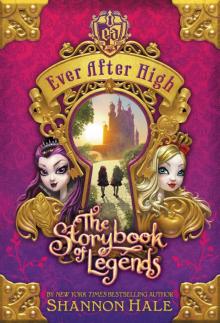 The Storybook of Legends
The Storybook of Legends Princess Academy
Princess Academy Austenland
Austenland The Forgotten Sisters
The Forgotten Sisters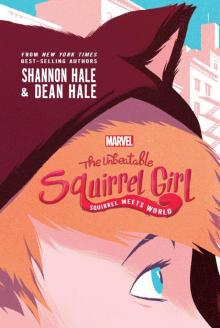 The Unbeatable Squirrel Girl: Squirrel Meets World
The Unbeatable Squirrel Girl: Squirrel Meets World Book of a Thousand Days
Book of a Thousand Days Fire and Ice
Fire and Ice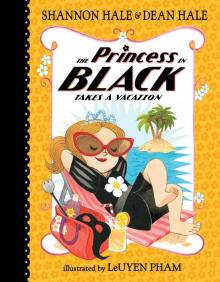 The Princess in Black Takes a Vacation
The Princess in Black Takes a Vacation River Secrets
River Secrets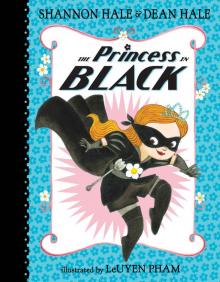 The Princess in Black
The Princess in Black Books of Bayern Series Bundle
Books of Bayern Series Bundle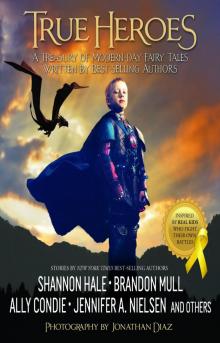 True Heroes
True Heroes Austenland: A Novel
Austenland: A Novel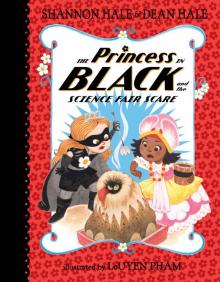 The Princess in Black and the Science Fair Scare
The Princess in Black and the Science Fair Scare![[Bayern 02] - Enna Burning Read online](http://i1.bookreadfree.com/i1/04/02/bayern_02_-_enna_burning_preview.jpg) [Bayern 02] - Enna Burning
[Bayern 02] - Enna Burning Ever After High
Ever After High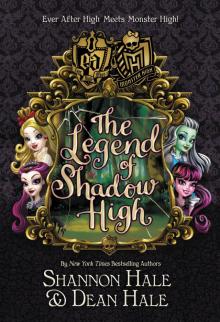 Monster High/Ever After High--The Legend of Shadow High
Monster High/Ever After High--The Legend of Shadow High